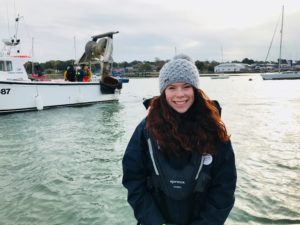Celine Gamble graduated from the University of Exeter, Penryn Campus, with an MSc in Conservation and Biodiversity, 2017. She currently works as the Native Oyster Network Coordinator (UK & Ireland).

After graduation I worked within the Engagement team of the British Science Association. During which I worked on the annual British Science Festival as a Festival Officer. More recently I have started working for the Zoological Society of London (ZSL) in their Marine and Freshwater Department as a Project Coordinator for the newly formed Native Oyster Network (UK and Ireland). I’m very much enjoying the role so far, as it’s a good combination of conservation science and policy, networking, fieldwork and science communication.
I’ve always wanted to pursue a career in marine conservation, and during University I was drawn towards communicating science. Therefore a role where I can combine the two is perfect for me. The most enjoyable aspect of my current role is having the opportunity to visit native oyster restoration projects across the UK and Ireland, and be able to get out on the boat and assist with their fieldwork.
“My advice for anyone beginning a career within marine conservation would be to be persistent, and to be aware that it could take a few interviews and some time before landing your dream job.”
I enjoyed studying at the University of Exeter firstly due to the amazing location of the Penryn campus, with access to marine coastal habitat on its doorstep. And secondly due to the support and expertise of the lecturers in the Bioscience department.
I would say that being involved with extra-curricular opportunities, such as university societies and groups, helped build my independent working and confidence when delivering a project. I also found that modules such as Science in Society and Exploitation of the Sea, have been useful in terms of the science communication route that I’ve pursued.
The advice I would give to a current student, would be to throw yourself into extra-curricular opportunities and to research opportunities to volunteer for projects/ organisations that you’d hope to work for in the future. I would also say, don’t hold back from getting in touch with individuals who work in roles you’d like to see yourself in, as 9/10 times they will be more than happy to provide advice.
My current contract is for two years, after which I would hope to move into a manager role within a similar marine conservation project or organisation.
My advice for anyone beginning a career within marine conservation would be to be persistent, and to be aware that it could take a few interviews and some time before landing your “dream job”. But don’t let that put you off.
